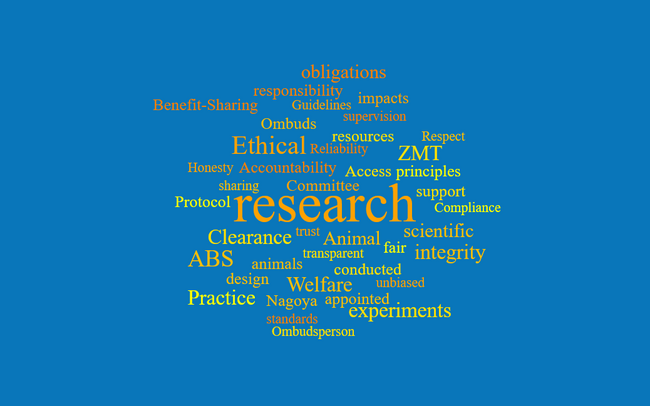Research conducted with integrity allows others to have trust and confidence in the methods used and in the resulting findings. Good research practices at the ZMT are based on fundamental principles of research integrity. These principles are as defined by the European code of conduct (Allea, page 4):
Reliability in ensuring the quality of research, reflected in the design, the methodology, the analysis and the use of resources. Honesty in developing, undertaking, reviewing, reporting and communicating research in a transparent, fair, full and unbiased way. Respect for colleagues, research participants, societies, ecosystems, cultural heritage and the environment. Accountability for the research from idea to publication, for its management and organisation, and its wider impacts. Accountability extends to training, supervision and mentoring. These different aspects of ZMT Research integrity are further outlined on the following web pages.
Good scientific practice and ombuds services
ZMT has committed itself to the Leibniz Code for Good Research Practice in 2022 and sets out additional standards of good scientific practice, definitions of misconduct and the role of the Leibniz Association’s Ombuds Committee in its Guidelines for Good Scientific Practice. Details of the implementation are provided at the ZMT website “Ombudsperson”.
Research ethics
Research clearance at the ZMT typically involves an ethical clearance committee looking at the research aims and methodologies of researchers to make sure that the research will be conducted in a way that protects the dignity, rights and safety of the research participants, and that the research design is ethically sound and is likely to render the anticipated results. Further information on the mandatory Ethical Clearance form of the social science department is given at the ZMT intranet page “Ethical Clearance”.
Animal experiments
Some studies at the ZMT rely on animal experiments. The scientists take their responsibility for the welfare of the animals entrusted to them very seriously. Animal experiments are guided by the 3R’s principle to use alternative, animal-free methods whenever possible (Replacement), to minimize the number of animals used when no alternative methods are available (Reduction) and to use and possibly develop state-of-the-art methods to reduce harm and suffering of animals in scientific procedures (Refinement). The ZMT appointed an Animal Welfare Officer and an Animal Welfare Committee for support in Animal Protection Matters. Further information is given at the ZMT intranet page “Animal welfare”.
The Nagoya Protocol
The Nagoya Protocol on Access and Benefit-Sharing (ABS) is an international agreement that aims at the fair and equitable sharing of benefits arising from the utilization (research and/or development) of genetic resources (and/or traditional knowledge associated to them). The ZMT appointed a Nagoya Compliance Advisor in 2022 for support in Access obligations, Benefit-sharing obligations and Compliance obligations. Further information is detailed at the ZMT website “The Nagoya Protocol at ZMT”.





